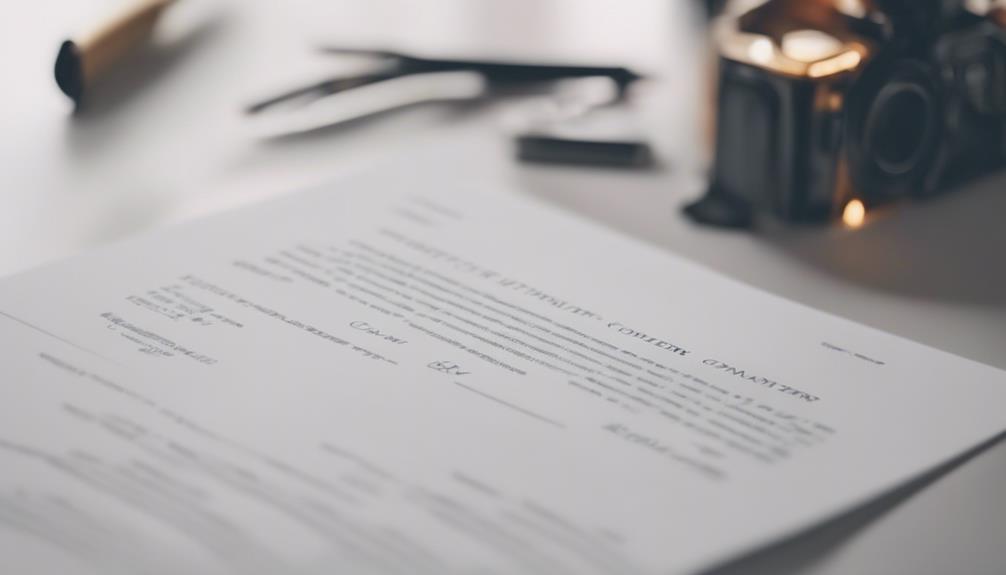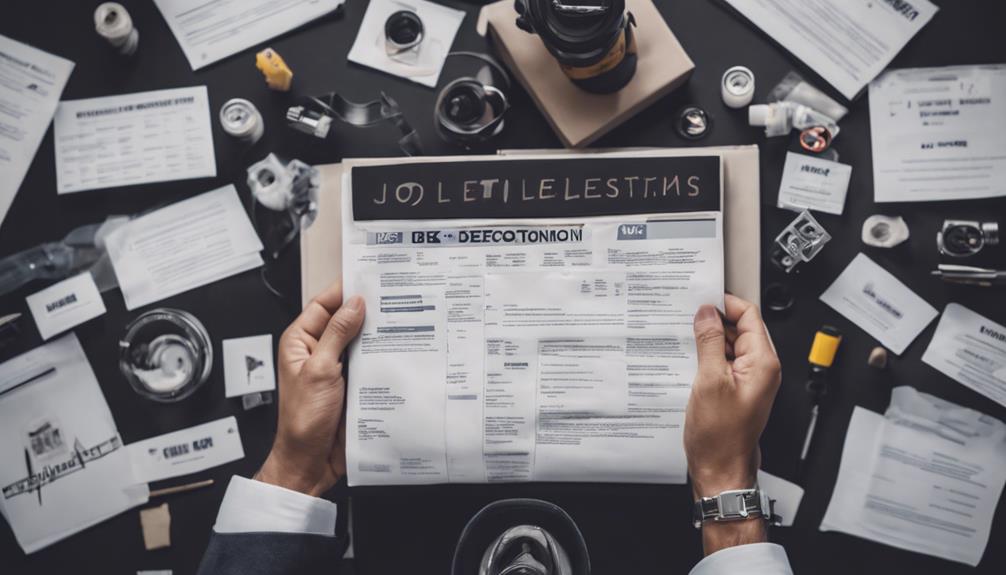Craft a compelling cover letter with these seven tips: Use a professional font, keep it concise, and use bullet points. Tailor it to the job by highlighting key skills and experiences. Research the company and incorporate keywords. Showcase your relevant skills and how they benefit the company. Emphasize achievements and back them up with evidence. Avoid discussing salary prematurely. These tips will help you stand out.
Key Takeaways
- Tailor each cover letter to the specific job and company.
- Highlight relevant accomplishments and experiences.
- Address the hiring manager by name if possible.
- Use keywords from the job description.
- Show genuine interest in the company and its needs.
Formatting and Readability

When creating your cover letter, choose a neat and professional font like Arial or Times New Roman to ensure readability and improve the overall presentation.
To follow cover letter guidelines, keep the content brief and restrict it to one page. Use bullet points to arrange information efficiently, highlighting important accomplishments or skills.
Regarding layout, align your text to the left for easy reading and maintain standard margins for a polished appearance. Remember to use bold or italics sparingly to highlight important details without overpowering the reader.
Tailoring to Specific Roles

Tailoring your cover letter to match the requirements and expectations of a specific job role greatly enhances your chances of standing out to potential employers. When crafting your cover letter, make sure to closely examine the job description to identify the key skills and experiences the employer is seeking.
Address the hiring manager by name to personalize the letter and demonstrate your attention to detail. Highlight your relevant accomplishments and experiences that directly align with the job requirements. By customizing your cover letter for each application, you show a genuine interest in the position and the company.
Providing specific examples of how your skills and experiences make you a perfect fit for the job not only showcases your qualifications but also illustrates your potential contributions to the team. Remember, a tailored cover letter not only sets you apart from other candidates but also shows your dedication and effort in pursuing the specific role.
Researching Company and Job

Researching the company and job thoroughly before writing your cover letter is essential for demonstrating your genuine interest and understanding of the organization's needs.
To guarantee your cover letter hits the mark, consider the following tips:
- Company Culture: Tailoring your cover letter to reflect the company's culture can show your fit within the organization.
- Mutual Connections: Mentioning any mutual connections or referrals can help establish a personal connection with the employer.
- Keywords: Incorporating keywords from the job description can help your cover letter stand out in the applicant pool.
- Alignment with Company's Needs: Demonstrating how your skills and experience align with the company's specific requirements can impress the hiring manager.
Highlighting Experiences and Skills

To effectively showcase your suitability for a job, emphasize your relevant experiences and skills that directly align with the position's requirements.
When crafting your cover letter, focus on how your skills, like problem-solving and communication, can specifically benefit the company in the role you're applying for.
Highlight your ability to transfer skills gained from past experiences to excel in the new position.
It's essential to avoid including irrelevant experiences and skills that don't relate directly to the job.
Instead, showcase your relevant accomplishments, such as surpassing sales targets or successfully leading projects, to demonstrate the unique value you can bring to the company.
Emphasizing Achievements

Highlighting your accomplishments in your cover letter can greatly enhance your candidacy for the position by showcasing your value to the employer.
When emphasizing achievements in your cover letter, consider the following:
- Mention professional awards or special recognition you have received to make yourself stand out.
- Select accomplishments that directly align with the job requirements to demonstrate your qualifications effectively.
- Provide specific examples of how you exceeded expectations in previous roles to show your capabilities.
- Back up your achievements with evidence to strengthen your candidacy for the position.
Avoiding Salary Discussions

When crafting your cover letter, remember to steer clear of delving into salary discussions right away. Instead, focus on highlighting your skills and passion for the role you're applying for.
Keep the conversation centered on what you bring to the table rather than what you expect regarding compensation.
Salary Expectation Etiquette
Avoid delving into salary expectations in your cover letter to maintain focus on showcasing your qualifications and fit for the job. When addressing salary in your cover letter, it's crucial to maintain a professional tone and highlight the value you can bring to the company.
To handle salary expectation etiquette effectively, consider the following tips:
- Keep the conversation centered on the value you bring to the company rather than monetary considerations.
- If necessary, provide a vague salary range or state that you're open to discussing compensation during the interview process.
- Emphasize your interest in the role and your enthusiasm to contribute to the company's success without mentioning salary.
- Save detailed discussions about salary for later stages of the hiring process to maintain a positive and professional tone in your cover letter.
Compensation Conversation Etiquette
To maintain focus on showcasing your qualifications and fit for the job, refrain from initiating salary discussions in your cover letter. Bringing up salary expectations can detract from highlighting your skills and experience that make you the ideal candidate.
Instead, center the conversation on the value you can bring to the company and your enthusiasm for the position. If you feel compelled to mention salary, opt for a vague salary range rather than specific figures, keeping the emphasis on your interest in the role itself.
By avoiding detailed discussions about monetary aspects at this stage, you can maintain a professional tone and demonstrate your commitment to the opportunity based on merit and passion.
Leave the nitty-gritty of salary negotiations for later stages of the interview process, ensuring that your cover letter remains focused on your qualifications and potential contributions to the organization.
Providing Evidence and Support

Support your claims in the cover letter with concrete facts and data to showcase your credibility effectively. When providing evidence and support in your cover letter, remember to incorporate numbers and statistics, as well as quantifiable results to highlight your achievements and skills.
Utilize specific examples that demonstrate your qualifications for the job, and make sure to use evidence-based statements to solidify your position as a strong candidate.
Here are some key points to take into account when including evidence in your cover letter:
- Incorporate numbers and statistics to provide evidence of your achievements and skills.
- Use quantifiable results to demonstrate the value you can bring to the company.
- Prove your skills and accomplishments with specific examples.
- Utilize evidence-based statements to showcase yourself as a strong candidate.
Frequently Asked Questions
What Are the 5 Tips to Writing an Amazing Cover Letter?
To write an amazing cover letter, tailor it to the job, highlight relevant skills, use a professional format, avoid resume repetition, and proofread meticulously. These tips will help you stand out to employers.
What Are 5 Common Cover Letter Mistakes?
You should avoid poor spelling/grammar, improper format, being too wordy, sharing irrelevant personal details, and not customizing your cover letter. These mistakes can hinder your chances of standing out and landing the job.
What Are the Don'ts of Writing a Cover Letter?
Crafting a cover letter is like painting a picture; avoid generic details, impersonal templates, resume repetition, slang, and self-centered content. Instead, focus on your contribution to the company for a professional touch.
What Is the Biggest Mistake Job Seekers Make When Writing Cover Letters?
Not tailoring your cover letter to the job you're applying for is the biggest mistake. Avoid sending generic applications. Show how your skills match the job requirements. Personalize each cover letter to stand out to employers.
Conclusion
To wrap up, crafting a standout cover letter is essential for landing your dream job. By following these 7 tips, you can increase your chances of impressing hiring managers and standing out from the competition.
Remember, your cover letter is your first impression, so make it count. Just like a well-tailored suit at a fancy event, your cover letter should showcase your best qualities and leave a lasting impression.
Good luck on your job search!









